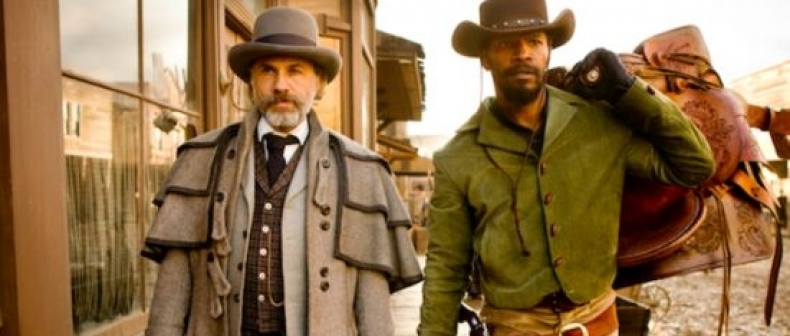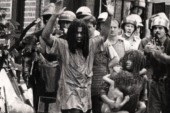
“Django Unchained”
Quentin Tarantino’s Django Unchained is a knowing, big-budget take on all those blaxploitation-era slavery epics like Mandingo and Goodbye, Uncle Tom, and accordingly it features many, many scenes of blacks being victimized and degraded. (Never before in a mainstream movie has the N-word been used so often or so casually.) For the first hour or so I accepted this as a more or less necessary element of the movie. It’s a revenge saga, after all, and the title character — a slave played by Jamie Foxx who becomes a Whitey-killing bounty hunter — has to suffer and/or witness a certain amount of abuse before he can take that sweet, sweet revenge. But the degradation — to him and to an assortment of other slaves — never lets up. In fact, it gets worse and more gleefully outré as the movie goes on, and at some point I simply got tired of mentally defending Tarantino as a well-meant provocateur. He’s not illuminating racist abuse here, he’s just callously brandishing it for “transgressive” kicks. Our foreknowledge that Django eventually wins out shouldn’t be a licence for Tarantino to rub our faces in lurid sadism.
On paper, Django isn’t that different from Tarantino’s excellent Inglourious Basterds, a revisionist take on the Holocaust in which Jewish Nazi-hunters successfully ambushed and neutralized Hitler. Though it, too, was a semi-jokey payback fantasy, it didn’t feel the need to show Jews being dehumanized in every other scene. The emphasis was on the Jewish resistance effort, and it featured characters with a degree of agency. In Django, the title character spends the first hour as a nearly somnambulant pawn in another man’s game, the second hour essentially gearing up for his revenge, and the third hour stuck in the Auschwitz of the antebellum South: a monstrously abusive plantation called Candy Land. It isn’t until the last 10 minutes or so that he exacts his (disappointingly routine) revenge, and it feels much too little, too late.
It would be one thing if the non-stop racial horrors were depicted with a smidgen of gravity, but mostly they’re played for outrageousness. In just one instance, a brutal “Mandingo” fight — two black men battling to the death for the delectation of their white masters — is intercut with shots of the plantation owner, Calvin Candie (Leonardo DiCaprio), sipping liqueur from a coconut with a straw. I know it’s not cool to take umbrage at the tastelessness of a Tarantino movie — tastelessness is his métier, and he’s done brilliant things with it in the past. But Django Unchained brings out too many of his worst impulses. Essentially, it’s a feature-length version of his “Dead Nigger Storage” routine in Pulp Fiction. Which is to say, it’s meant to be uproarious and daring — a joke about racism, not a racist joke — but it’s too shallow and unfeeling, and it leans way too much on noxious white-guy privilege.
It’s a shame, because many of Tarantino’s best qualities are on display here as well. The opening scene, in which chatty German bounty hunter Schultz (Christoph Waltz) verbally outwits two redneck slave traders and finagles Django’s freedom, is beautifully done — a perfect balance of dramatic weight and loony irreverence. (I especially enjoyed Schultz’s entrance: “Please allow me to introduce myself. I am Herr Schultz and these are my horses, Tony and Fritz.”) But when Schultz presses Django into another form of subservience — tracking down his former masters so that Schultz can kill them — I began to get a sinking feeling in my stomach. Why put Django in the sidekick position? And why make the white character highly articulate and worldly while the black character is inarticulate and half benumbed? Whose fantasy is this, exactly? Again, I went along with the scenario, assuming Tarantino would turn it on its head eventually. But bizarrely, the dynamic remains largely intact. Django develops more confidence and strength — and Foxx brings a growing sense of manly dignity to an underwritten role — but he never really steps out from Schultz’s shadow.
It’s not that I wanted (or expected) the movie to be PC. I just wanted it to be fresh, and for the black characters to take the spotlight in a movie ostensibly about them and their history. But Waltz and DiCaprio get all the most memorable scenes, the latter getting fairly good mileage out of his demonic, dandified cracker. As Django’s enslaved wife Broomhilda, Kerry Washington has the most unrewarding role — she’s brutalized in most of her scenes, and she never gets to be anything more than a damsel in distress. The plummiest black role belongs to yet another oppressor: Stephen (Samuel L. Jackson), Candy Land’s resident “house nigger,” who’s possibly the most vile, traitorous Uncle Tom ever put onscreen.
Even if you don’t find the movie ugly and dispiriting, you’re likely to find it lumpy and misshapen. Tarantino rushed to get the film ready for a Christmas release, and there are many scenes that could use a trim or be cut outright. (Of course, this could be said of most of Tarantino’s films, and they weren’t all hurried.) I found the Candy Land section especially protracted, and the double finale is a flat-out mistake, the second finale being pretty much identical to the first. Also a mistake: Tarantino putting himself onscreen at the 11th hour as, yes, a horrible, repulsive slave trader. (Way to inflame your critics, dude.)
I totally get Tarantino’s love of blaxploitation-era moviemaking — I love quite a few of those movies myself. But what he doesn’t seem to get is that the crudity of those pictures was semi-defensible because it was what the studios would finance back then. It was either that or nothing for black audiences. Tarantino, forty years later, has the freedom to do pretty much whatever he wishes, and yet he just rehashes the same morally and racially questionable thrills. Instead of using his talents on something worth doing, he’s using them to get away with material that isn’t worth a damn.
[Django Unchained opens across Canada on Dec. 25.]
____
Scott MacDonald writes about cinema for Toronto Standard. You can follow him on Twitter at @scottpmac. He just started tweeting, so be gentle with him.
For more, follow us on Twitter @TorontoStandard and subscribe to our newsletter.














